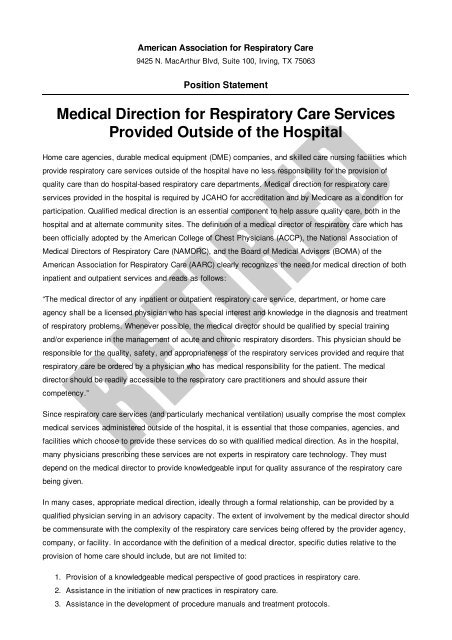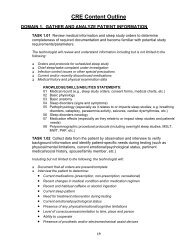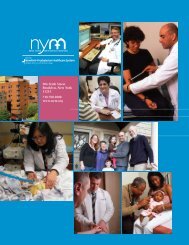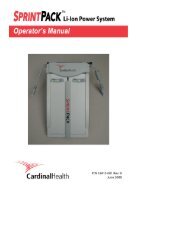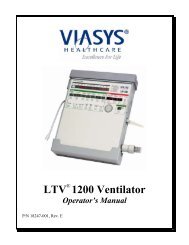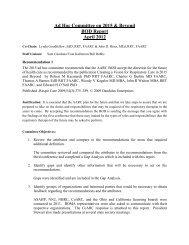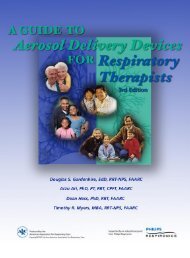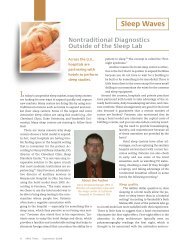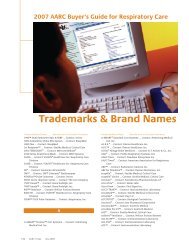Medical Direction for Respiratory Care Services ... - AARC.org
Medical Direction for Respiratory Care Services ... - AARC.org
Medical Direction for Respiratory Care Services ... - AARC.org
Create successful ePaper yourself
Turn your PDF publications into a flip-book with our unique Google optimized e-Paper software.
American Association <strong>for</strong> <strong>Respiratory</strong> <strong>Care</strong>9425 N. MacArthur Blvd, Suite 100, Irving, TX 75063Position Statement<strong>Medical</strong> <strong>Direction</strong> <strong>for</strong> <strong>Respiratory</strong> <strong>Care</strong> <strong>Services</strong>Provided Outside of the HospitalHome care agencies, durable medical equipment (DME) companies, and skilled care nursing facilities whichprovide respiratory care services outside of the hospital have no less responsibility <strong>for</strong> the provision ofquality care than do hospital-based respiratory care departments. <strong>Medical</strong> direction <strong>for</strong> respiratory careservices provided in the hospital is required by JCAHO <strong>for</strong> accreditation and by Medicare as a condition <strong>for</strong>participation. Qualified medical direction is an essential component to help assure quality care, both in thehospital and at alternate community sites. The definition of a medical director of respiratory care which hasbeen officially adopted by the American College of Chest Physicians (ACCP), the National Association of<strong>Medical</strong> Directors of <strong>Respiratory</strong> <strong>Care</strong> (NAMDRC), and the Board of <strong>Medical</strong> Advisors (BOMA) of theAmerican Association <strong>for</strong> <strong>Respiratory</strong> <strong>Care</strong> (<strong>AARC</strong>) clearly recognizes the need <strong>for</strong> medical direction of bothinpatient and outpatient services and reads as follows:“The medical director of any inpatient or outpatient respiratory care service, department, or home careagency shall be a licensed physician who has special interest and knowledge in the diagnosis and treatmentof respiratory problems. Whenever possible, the medical director should be qualified by special trainingand/or experience in the management of acute and chronic respiratory disorders. This physician should beresponsible <strong>for</strong> the quality, safety, and appropriateness of the respiratory services provided and require thatrespiratory care be ordered by a physician who has medical responsibility <strong>for</strong> the patient. The medicaldirector should be readily accessible to the respiratory care practitioners and should assure theircompetency.”Since respiratory care services (and particularly mechanical ventilation) usually comprise the most complexmedical services administered outside of the hospital, it is essential that those companies, agencies, andfacilities which choose to provide these services do so with qualified medical direction. As in the hospital,many physicians prescribing these services are not experts in respiratory care technology. They mustdepend on the medical director to provide knowledgeable input <strong>for</strong> quality assurance of the respiratory carebeing given.In many cases, appropriate medical direction, ideally through a <strong>for</strong>mal relationship, can be provided by aqualified physician serving in an advisory capacity. The extent of involvement by the medical director shouldbe commensurate with the complexity of the respiratory care services being offered by the provider agency,company, or facility. In accordance with the definition of a medical director, specific duties relative to theprovision of home care should include, but are not limited to:1. Provision of a knowledgeable medical perspective of good practices in respiratory care.2. Assistance in the initiation of new practices in respiratory care.3. Assistance in the development of procedure manuals and treatment protocols.
4. Assistance in establishing standards to assure that the individuals providing respiratory care servicesare qualified.5. Serving as an education resource <strong>for</strong> respiratory care practitioners, other members of the health careteam, the public, and third party payers.6. Establishment of standards to assure that physicians’ orders are appropriate; discussion of problemorders with the responsible physicians when necessary; and provision of consultation concerning themost appropriate care when requested.7. Monitoring of methods being used <strong>for</strong> patient assessment, including physical examinations andphysiologic measurements which are done outside of the hospital.8. Assistance in the development and review of policies related to selection, maintenance, repair andcleaning of equipment use in respiratory care.9. Assistance in assuring compliance with state and federal regulations regarding provision ofrespiratory care services.10. Being readily accessible to the respiratory care practitioners.Effective 12/89Position Statements | <strong>AARC</strong>.<strong>org</strong>


